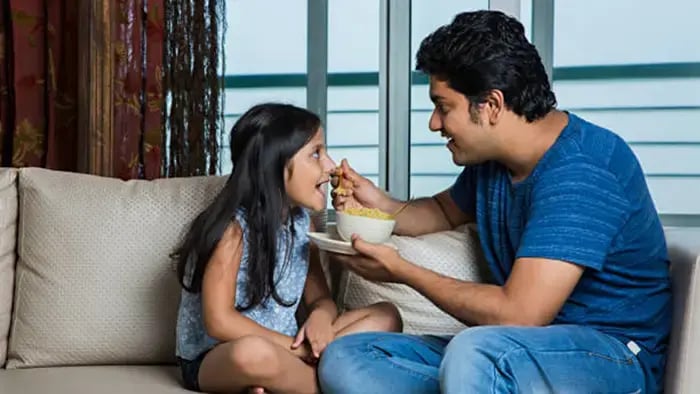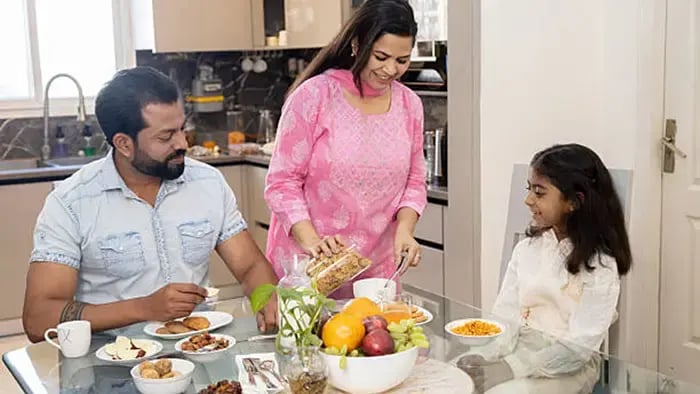- Toddlers (1–3 Years): Small Bites, Big Nutrition
- Preschoolers (4–5 Years): Food Curiosity
- Early Primary (6–7 Years): Focus and Fullness
- Middle Primary (8–9 Years): Stronger Digestion and Stamina
- Preteens (10–12 Years): Preparing for Growth Spurts
- For Lactose-Intolerant Kids: Nutrition without Dairy
- Evening Snack Time: From Junk to Joyful Eating
- Hydration Through Food
- Balanced Weekend Treats
Introduction
As children grow, their nutritional needs change, and that's where the right food at the right time comes in. Properly balanced food containing proteins, carbohydrates, healthy fats, vitamins, and minerals supports their physical and mental development from toddlers through preteens.

A well-planned diet does more than just give them energy and immunity, it helps build stronger bones, sharper focus and a healthier digestive system. For younger kids, meals should be soft, colourful and packed with nutrients in small portions. As they get older, you can mix things up, add grains, pulses, dairy, fruits, vegetables and healthy snacks that match their energy levels and daily activities. Seasonal ingredients and simple home-cooked meals work well.
One of the most important things you can do is help your child develop healthy eating habits from the start. Encouraging meal time or involving them in preparing meals are a few ways to develop healthy eating habits. Every child is different, but the basics of nutrition stay the same: meals should fuel their body, support their growth, and bring them comfort.
A Guide For The Best Diet Plans for Kids

Toddlers (1–3 Years): Small Bites, Big Nutrition
At this age, your child’s tummy is small, but the nutritional needs are big. As per research (J Nutr Sci. 2021), include soft, easy-to-chew foods like dal, khichdi, suji halwa, banana and boiled veggies. Full-fat milk, curd and a small amount of ghee help in brain development and digestion. Keep meals frequent and colourful. Toddlers love variety and finger foods, so turn nutrition into a game of taste and texture.
Preschoolers (4–5 Years): Food Curiosity
According to the Indian Academy of Paediatrics (IAP), this age group is where the kid's body forms food habits. Add whole grains like roti, brown rice, poha along with seasonal fruits like mango or watermelon and veggies like bhindi or carrots. Make tiffins interesting with mixed veg parathas, idli or small paneer wraps. Involve them in mealtime decisions. Soft-boiled eggs or dal chilla also make great additions.
Early Primary (6–7 Years): Focus and Fullness
According to the National Academies Press 2013, Children need balanced energy to focus in school and stay active. Include protein-rich foods like moong dal, paneer, curd rice, and boiled eggs. You can add fresh veggies to their meals and ensure snacks are healthy—fruit slices with peanut butter or murmura chaat with veggies. Curd or ragi laddoo provides calcium for bone growth and spinach helps with mental alertness.
Middle Primary (8–9 Years): Stronger Digestion and Stamina
Research done by, National Institute of Nutrition, India, suggests that at this age, appetite increases. Plan full meals with dal, roti, sabzi and a side of curd or buttermilk. Introduce millets like bajra or jowar and traditional recipes like veg upma or dalia. Add soaked almonds or dry fruit laddoos to support energy through the day. A mix of fibre, iron and protein keeps their digestion smooth and stamina strong.
Preteens (10–12 Years): Preparing for Growth Spurts
According to the National Academies Press 2001, this phase needs more iron, calcium and protein. You can add rajma, chana, paneer bhurji, egg curry and fruits like guava or papaya. Start by introducing sprouts in salads or wraps, whole wheat sandwiches with vegetables and paneer filling are good lunch options. Give options like coconut water or lemon shikanji to stay hydrated in the heat.
For Lactose-Intolerant Kids: Nutrition without Dairy
According to the National Institutes of Health (NIH), not all kids can have milk or curd. Replace dairy with calcium-rich foods like ragi, tofu, sesame seeds, almonds, and fortified plant milks like almond or soy milk. Use dal-based snacks like besan chilla and include green vegetables like methi and broccoli. Homemade peanut laddoos or date bars can provide healthy fat and energy.
Evening Snack Time: From Junk to Joyful Eating
According to a study published in, BMC Public Health 2024 it is suggested to avoid processed snacks, rather than that you can try homemade options like besan ladoos, fruit chaat, roasted chana or makhana. Air-popped popcorn, vegetable sandwiches or poha with peanuts are both light and filling. Evening snacks should fuel study time without making your child feel sluggish or heavy.
Hydration Through Food
To stay hydrated add fruits like watermelon, muskmelon, cucumber and orangesto kids diet. As per research done by, National Institute of Nutrition, India, these helps with hydration and provide vitamins. You can also add thin buttermilk, lemon water or aam panna for summer relief. Make sure your child drink water throughout the day, especially during school hours and after outdoor play.
Balanced Weekend Treats
You don’t need to avoid favorite foods, just balance them. Homemade pav bhaji, vegetable noodles or baked samosas can satisfy cravings in a better way. You can try home made sweets like kheer or fruit custard after meals.
It’s not about rules, it’s about making smart choices at every stage. Add a mix of traditional, seasonal, and fun to meals and build habits that last as your child grows.

Her love for storytelling began with reading her grandfather’s speeches, where Tarishi saw the power of words in creating lasting memories. Combining her passions for food and writing, she has turned her life into a fulfilling path of sharing stories that celebrate flavours and how food brings communities together.
The views expressed are that of the expert alone.
The information provided in this content is for informational purposes only and should not be considered a substitute for professional medical advice, diagnosis, or treatment. Always seek the advice of your physician or another qualified healthcare provider before making any significant changes to your diet, exercise, or medication routines.
References
https://www.nin.res.in/dietaryguidelines/pdfjs/locale/DGI24thJune2024fin.pdf
https://pmc.ncbi.nlm.nih.gov/articles/PMC11323379/
https://www.ncbi.nlm.nih.gov/books/NBK222309/
https://www.nin.res.in/downloads/DietaryGuidelinesforNINwebsite.pdf
https://www.ncbi.nlm.nih.gov/books/NBK201501/
https://iapindia.org/pdf/Ch-044-Nutrition-5-12-y-IAP-Parental-Guidelines-28112021.pdf
















